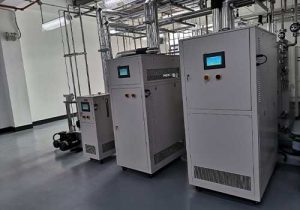water cooled chiller efficiency
Water-Cooled Chiller Efficiency: Understanding the Advantages
Water-cooled chiller systems are widely used in industrial and commercial applications for their ability to provide efficient and reliable cooling. When compared to air-cooled chillers, water-cooled systems offer several advantages, particularly in terms of energy efficiency. This article delves into the factors that contribute to the efficiency of water-cooled chillers and how they outperform air-cooled counterparts.

Enhanced Energy Efficiency
Water-cooled chiller systems are known for their high energy efficiency. According to various sources, water is a more effective heat transfer medium than air, which allows water-cooled chillers to require less energy to achieve the desired cooling effect compared to air-cooled chillers. This energy efficiency translates into lower operating costs and a reduced environmental impact.
Operation Under Varying Loads
The efficiency of water-cooled chillers is also influenced by their operation under different loads. Chillers must maintain a high-efficiency operation standard under varying conditions, not just at full load. For instance, ASHRAE has an integrated part-load value for centrifugal water chillers used in building air conditioning, emphasizing the importance of efficiency across different operation levels.

Impact of Water Temperature
The efficiency of water-cooled chillers is directly related to the temperature of the water used in the cooling process. Lower cooling water inlet temperatures can enhance the energy-saving effects of variable-frequency chillers. Additionally, the climate temperature of different regions affects the energy-saving potential of chiller operation, with higher inlet water temperatures of cooling water affecting the operation efficiency.
Advanced Control Systems
Advanced control systems play a significant role in the efficiency of water-cooled chillers. For example, the application of appropriate control methods can significantly influence the coefficient of performance and system stability. Variable speed compressors and electronic expansion valves can also contribute to the stability and performance of water chiller systems.
Consistent Temperature Control
Water-cooled chiller systems provide precise and consistent temperature control, which is crucial for applications where maintaining a specific temperature range is essential. This stable cooling performance ensures that industrial processes, equipment, and products are not adversely affected by temperature fluctuations.

Space Efficiency and Quiet Operation
Water-cooled chiller systems typically have a more compact design compared to air-cooled counterparts, making them suitable for installations where space is limited. They are also known for their quieter operation, creating a more comfortable and less disruptive environment for both workers and nearby residents.
Extended Equipment Lifespan and Adaptability
The efficient heat dissipation provided by water-cooled chiller systems contributes to the longevity of associated equipment. By maintaining optimal operating temperatures, these systems help prevent excessive wear and tear on machinery, resulting in fewer breakdowns and extended equipment lifespan. They are also well-suited for applications with high heat loads, where consistent and robust cooling is crucial.
Environmental Sustainability
Water-cooled chiller systems contribute to environmental sustainability by reducing energy consumption and minimizing greenhouse gas emissions. Their efficiency and adaptability make them an eco-friendly choice for companies aiming to meet environmental goals.
Conclusion
Water-cooled chiller systems offer a range of benefits over air-cooled chillers, particularly in terms of energy efficiency. Their ability to maintain consistent temperature control, operate quietly, and adapt to high heat loads, combined with their environmental sustainability, make them an attractive choice for a variety of industrial and commercial applications. Understanding the factors that contribute to their efficiency is crucial for selecting the most appropriate cooling system for a given application.
Related recommendations
supplier chiller
776In many industrial processes, temperature control is a critical factor that can affect the quality of products and the efficiency of operations. Supplier chillers play a vital role in these proces...
View detailslow temperature cooling system
343Low Temperature Cooling System: An In - Depth ExplorationIn numerous scientific, industrial, and technological fields, the ability to achieve and maintain low temperatures is of paramount importa...
View detailsthe temperature controller
323A temperature controller is a fundamental electronic device designed to monitor and adjust the temperature of a specific environment, process, or piece of equipment by regulating heating or coolin...
View detailsSelection, Configuration and Application of Industrial Chillers
1628Selection, Configuration and Application of Industrial Chillers There are many processing plants that use industrial chillers, but many friends don’t know how to choose the unit when they buy...
View details
 LNEYA Chiller
LNEYA Chiller






HelloPlease log in